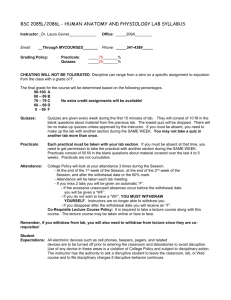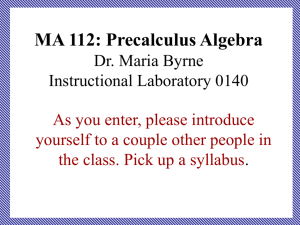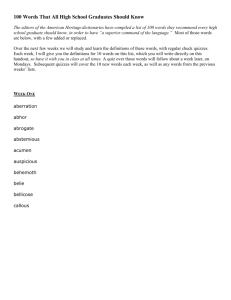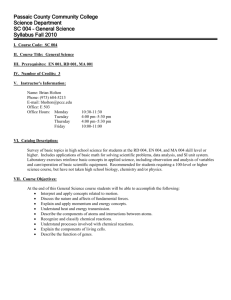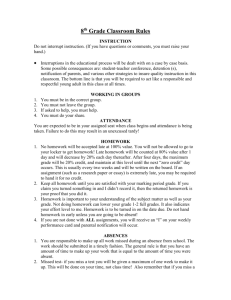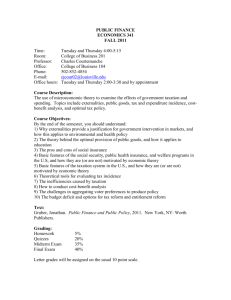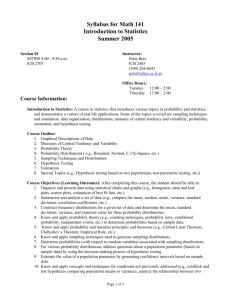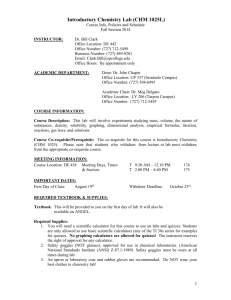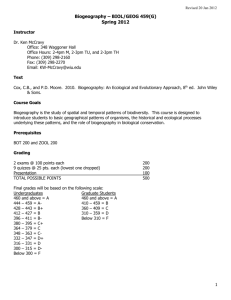Physics 200 - Light and Atoms
advertisement
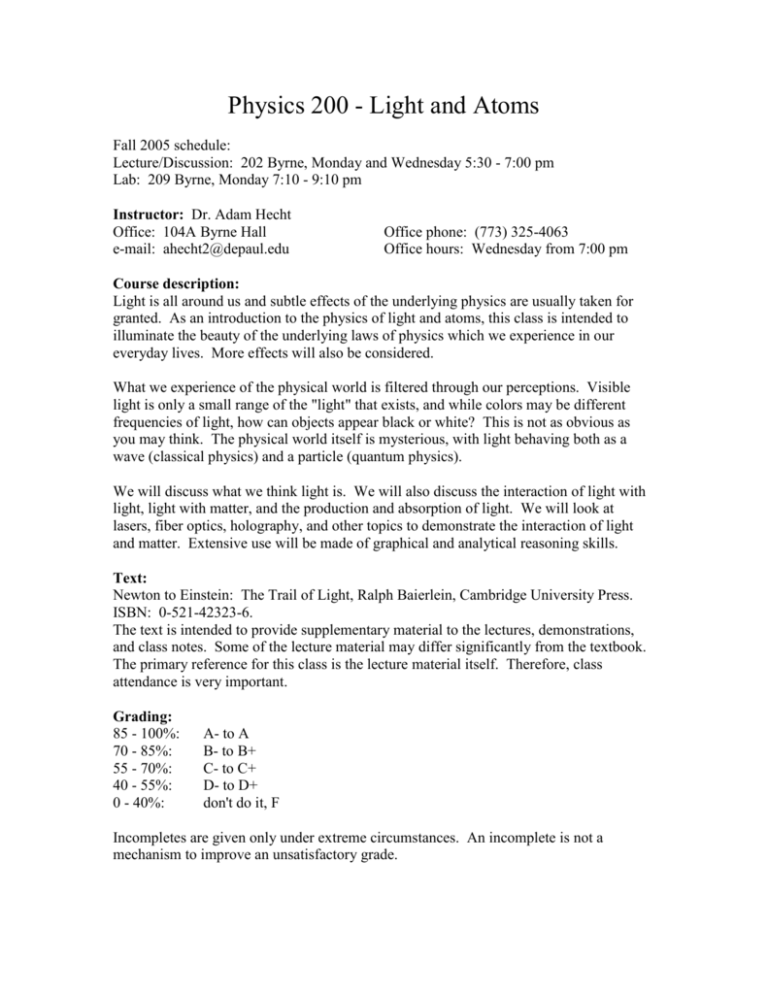
Physics 200 - Light and Atoms Fall 2005 schedule: Lecture/Discussion: 202 Byrne, Monday and Wednesday 5:30 - 7:00 pm Lab: 209 Byrne, Monday 7:10 - 9:10 pm Instructor: Dr. Adam Hecht Office: 104A Byrne Hall e-mail: ahecht2@depaul.edu Office phone: (773) 325-4063 Office hours: Wednesday from 7:00 pm Course description: Light is all around us and subtle effects of the underlying physics are usually taken for granted. As an introduction to the physics of light and atoms, this class is intended to illuminate the beauty of the underlying laws of physics which we experience in our everyday lives. More effects will also be considered. What we experience of the physical world is filtered through our perceptions. Visible light is only a small range of the "light" that exists, and while colors may be different frequencies of light, how can objects appear black or white? This is not as obvious as you may think. The physical world itself is mysterious, with light behaving both as a wave (classical physics) and a particle (quantum physics). We will discuss what we think light is. We will also discuss the interaction of light with light, light with matter, and the production and absorption of light. We will look at lasers, fiber optics, holography, and other topics to demonstrate the interaction of light and matter. Extensive use will be made of graphical and analytical reasoning skills. Text: Newton to Einstein: The Trail of Light, Ralph Baierlein, Cambridge University Press. ISBN: 0-521-42323-6. The text is intended to provide supplementary material to the lectures, demonstrations, and class notes. Some of the lecture material may differ significantly from the textbook. The primary reference for this class is the lecture material itself. Therefore, class attendance is very important. Grading: 85 - 100%: 70 - 85%: 55 - 70%: 40 - 55%: 0 - 40%: A- to A B- to B+ C- to C+ D- to D+ don't do it, F Incompletes are given only under extreme circumstances. An incomplete is not a mechanism to improve an unsatisfactory grade. Grades are based on homework, laboratories, and in class quizzes and examinations. The relative weights are as follows: Final exam Mid-term exam Quizzes Homework Laboratories 25% 20% 15% 20% 20% The student may drop one lab score. Missed labs or exams without prior approval from the instructor will result in a score of zero. Information on university policy regarding grading may be found in the "Evaluation and Credit" section of the undergraduate bulletin. Quizzes: Quizzes are designed to help you keep up with the class. Therefore make-up quizzes will not be given and missed quizzes will be given a score of zero. The lowest quiz score may be dropped. If a second quiz is missed I may consider averaging the quiz scores from your other quizzes, depending on attendance, class participation, and general class performance. Midterm and Final exams: See class schedule. The midterm will be cumulative. The final will be cumulative but with emphasis on the material covered in the second half of the class. Make-up exams: Missing an exam will result in a score of zero unless the student has WRITTEN prior approval from the instructor. This will be given for serious emergencies. If prior approval is not possible (such as a concussion on the way to the exam) the student must contact the instructor as soon as possible and no later than the day of the exam. Homework: Homework will be assigned in class and will be due on the day specified. Scores for late homework will be deducted 10% for every weekday after the due date. Once graded homework is returned, a week after assignment, late homework may no longer be turned in. Laboratories: Laboratories are an integral part of this class. Students are expected to attend lab regularly and submit lab reports on time. Extra credit: Extra credit assignments will be announced in class. Attendance: Out of respect for the fact that you are adults, I will not monitor attendance on a regular basis. Note though that the primary source for this class is the lecture material. Also, the policy on missed quizzes is discussed above. The class deals with challenging concepts: It is in your best interest to attend lectures, it will help you keep up with the material. Students with disabilities: If you are registered with the Office of Students with Disabilites, please make an appointment with the course instructor to discuss any academic accommodations you may need. If you need academic accommodations and you are not registered with the Office of Students with Disabilites, please contact the office at 2250 N. Sheffield, Room 307, or by telephone at (773) 325-7290 (TTY 773 325-7296). Upon individual request, this syllabus can be made available in alternate forms. Academic integrity: Students are expected to understand and abide by the Academic Integrity Policy (http://studentaffairs.depaul.edu/handbook/code16.html). Cheating, copying, plagiarism, lying to the instructor, or disruptive classroom behavior will be dealt with according to the university procedures as outlined in the Student Handbook. The minimum penalty for plagiarism is a zero on the activity, with more serious penalties as warranted. If two or more students are found to share work, the same penalty will be applied to each, regardless of who copied from whom. You are responsible for safeguarding your work. Penalties may include a failing grade in the course and suspension or expulsion from the university. Don't do it. It is understood that laboratories may contain common analysis because of the group nature of these exercises. This is of course acceptable, but please do your own write-ups. Final note: There is no substitute for hard work. Unless you are unusually well prepared, you will find many parts of the course to be challenging. I encourage you to ask question if you do not understand the material. Ask during class, ask during labs, ask during office hours, ask via e-mail. Remember there are no bad questions, this is a learning experience: If you knew it all already you wouldn't be taking the class. Tentative laboratory schedule: The schedule is provided to give a sense of the laboratory program. Light and atoms are vast subjects and if student response steers us to different questions, I am willing to adapt the schedule. Lab Topic 1 Study of Motion in One Dimension: Interpreting Graphs Orientation and Exercises in EXCEL 2 Refraction of Light 3 The Prism Spectrometer 4 Interference of Waves: Standing Waves 5 Interference of Waves: Single and Double Slit 6 Interference and the Measurement of Wavelengths 7 The Photoelectric Effect 8 Atomic Spectroscopy I 9 Atomic Spectroscopy II 10 Laser Physics (Holography and/or Optical Communications) Last day of class: Monday, November 14 Final Examination: Byrne 202, 5:30 pm, November 16, 2005
